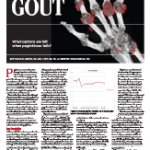Statins have anti-inflammatory/immunomodulatory effects that may be useful in preventing rheumatoid arthritis (RA), but previous observational studies about the risk of RA with statin use yielded conflicting results. In this large population-based study, high-intensity statin treatment was associated with a 23% reduced risk of RA when compared with low-intensity statin treatment. This is the largest study on the association of statins with RA risk to date, and the first to assess the effect of relative statin strength…
Search results for: obesity
Unclear If Sports Raise Later Arthritis Risk
(Reuters Health)—Playing team sports, especially soccer, at the elite level may lead to a higher risk for osteoarthritis, but the existing research is of such low quality it’s hard to say for sure, according to a recent review. In an analysis of past studies filled with conflicting results, researchers found that long-distance running was the…

Pharmacokinetics May Be Factor in Success of Pegloticase Therapy for Gout
We read the case report by Dr. Diana Girnita and colleagues (“Severe Refractory Gout: What options are left when pegloticase fails?” The Rheumatologist, August 2016) with interest. A case is reported of a subject with 20 years of chronic refractory gout who failed to respond to pegloticase therapy, and the potential roles of anti-drug antibodies or…

Rheumatoid Arthritis Research Provides New Insights on Risk Factors, Identification Tools, Intervention
Established wisdom holds that patients with rheumatoid arthritis (RA) will fare better if their disease is diagnosed as early as possible, and treatments with disease-modifying drugs are started before inflammation can do more damage to joints and tissue. Usually, early diagnosis means spotting the clinical signs of disease, but new research tells us more about…

Is Fibromyalgia Overdiagnosed?
Are too many patients diagnosed with fibromyalgia? The co-authors of one new study believe that close to 75% of patients who have received a clinical fibromyalgia diagnosis do not meet the 2010 Preliminary American College of Rheumatology (ACR) Criteria for Fibromyalgia.1 They say these patients are false-positive and may be taking treatments they don’t need….

How Rheumatologists Can Improve Patients’ Satisfaction, Patient Care, and Survey Scores
Many reasons exist to strive for high patient satisfaction, including those related to maintaining certification requirements, risk management, reimbursement and simply having a competitive practice, but the most important one is that by achieving high patient satisfaction, you will find that your patients will be more motivated and more engaged in their individual care, says…
ACR/ARHP 2016 Research Conferences Foster Exchanges with Colleagues Before Annual Meeting Start
Connect with colleagues at the Basic Research Conference (BRC) and the Clinical Research Conference (CRC) pre-meeting courses at the 2016 ACR/ARHP Annual Meeting! The ACR has an exceptional array of research leaders lined up for this year’s BRC and CRC sessions on Friday, Nov. 11, and Saturday, Nov. 12 in Washington, D.C. Get ready to…

Gout Treatment & Care Remain Suboptimal
A recent analysis compared the care of patients with RA with that received by patients with gout, finding that hospitalization and costs for patients with gout have increased, but both are decreasing for patients with RA. Unlike RA, significant advances in treatment have not been made for gout, despite its increasing prevalence, and patients may land in the hospital unnecessarily…
Psoriasis May Carry Atherosclerosis Risk Similar to that with Diabetes
(Reuters Health)—People with psoriasis may be at increased risk of coronary artery calcium buildup, comparable to that of people with diabetes, according to a new study. Comparing people in their 50s with psoriasis, diabetes or neither disease, researchers found that moderate to severe calcium buildup was about five times as common in people with diabetes…

Treating Asymptomatic Hyperuricemia Could Lower Risk of Developing Chronic Conditions
When uric acid becomes elevated in the human body, a variety of problems can develop, most notably gout—a painful, inflammatory arthritis caused by uric acid crystal deposition in joints. Chronically elevated uric acid can also lead to painful kidney stones. The majority of patients found to have hyperuricemia, however, never go on to develop gout…
- « Previous Page
- 1
- …
- 14
- 15
- 16
- 17
- 18
- …
- 26
- Next Page »